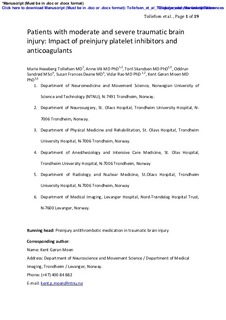| dc.contributor.author | Hexeberg, Marie | |
| dc.contributor.author | Vik, Anne | |
| dc.contributor.author | Skandsen, Toril | |
| dc.contributor.author | Sandrød, Oddrun | |
| dc.contributor.author | Deane, Susan Frances | |
| dc.contributor.author | Rao, Vidar | |
| dc.contributor.author | Moen, Kent Gøran | |
| dc.date.accessioned | 2019-02-25T10:29:30Z | |
| dc.date.available | 2019-02-25T10:29:30Z | |
| dc.date.created | 2018-07-02T13:49:48Z | |
| dc.date.issued | 2018 | |
| dc.identifier.citation | World Neurosurgery. 2018, 114 e209-e217. | nb_NO |
| dc.identifier.issn | 1878-8750 | |
| dc.identifier.uri | http://hdl.handle.net/11250/2587190 | |
| dc.description.abstract | Objective
We aimed to examine the effect of preinjury antithrombotic medication on clinical and radiologic neuroworsening in traumatic brain injury (TBI) and study the effect on outcome.
Methods
A total of 184 consecutive patients ≥50 years old with moderate and severe TBI admitted to a level 1 trauma center were included. Neuroworsening was assessed clinically by using the Glasgow Coma Scale (GCS) score and radiologically by using the Rotterdam CT score on repeated time points. Functional outcome was assessed with the Glasgow Outcome Scale Extended 6 months after injury.
Results
The platelet inhibitor group (mean age, 77.3 years; n = 43) and the warfarin group (mean age, 73.2 years; n = 20) were significantly older than the nonuser group (mean age, 63.7 years; n = 121; P ≤ 0.001). In the platelet inhibitor group 74% and in the warfarin group, 85% were injured by falls. Platelet inhibitors were not significantly associated with clinical or radiologic neuroworsening (P = 0.37–1.00), whereas warfarin increased the frequency of worsening in GCS score (P = 0.001–0.028) and Rotterdam CT score (P = 0.004). In-hospital mortality was higher in the platelet inhibitor group (28%; P = 0.030) and the warfarin group (50%; P < 0.001) compared with the nonuser group (13%). Platelet inhibitors did not predict mortality or worse outcome after adjustment for age, preinjury disability, GCS score, and Rotterdam CT score, whereas warfarin predicted both mortality and worse outcome.
Conclusions
In this study of patients with moderate and severe TBI, preinjury platelet inhibitors did not cause neuroworsening or predict higher mortality or worse outcome. In contrast, preinjury warfarin caused neuroworsening and was an independent risk factor for mortality and worse outcome at 6 months. Hence, fall prevention and liberal use of computed tomography examinations is important in this patient group. | nb_NO |
| dc.language.iso | eng | nb_NO |
| dc.publisher | Elsevier | nb_NO |
| dc.rights | Attribution-NonCommercial-NoDerivatives 4.0 Internasjonal | * |
| dc.rights.uri | http://creativecommons.org/licenses/by-nc-nd/4.0/deed.no | * |
| dc.title | Patients with moderate and severe traumatic brain injury: impact of preinjury platelet inhibitor or warfarin treatment | nb_NO |
| dc.type | Journal article | nb_NO |
| dc.type | Peer reviewed | nb_NO |
| dc.description.version | acceptedVersion | nb_NO |
| dc.source.pagenumber | e209-e217 | nb_NO |
| dc.source.volume | 114 | nb_NO |
| dc.source.journal | World Neurosurgery | nb_NO |
| dc.identifier.doi | 10.1016/j.wneu.2018.02.167 | |
| dc.identifier.cristin | 1595209 | |
| dc.description.localcode | © 2018. This is the authors’ accepted and refereed manuscript to the article. Locked until 07.03.2019 due to copyright restrictions. This manuscript version is made available under the CC-BY-NC-ND 4.0 license http://creativecommons.org/licenses/by-nc-nd/4.0/ | nb_NO |
| cristin.unitcode | 194,65,30,0 | |
| cristin.unitname | Institutt for nevromedisin og bevegelsesvitenskap | |
| cristin.ispublished | true | |
| cristin.fulltext | postprint | |
| cristin.qualitycode | 1 | |

